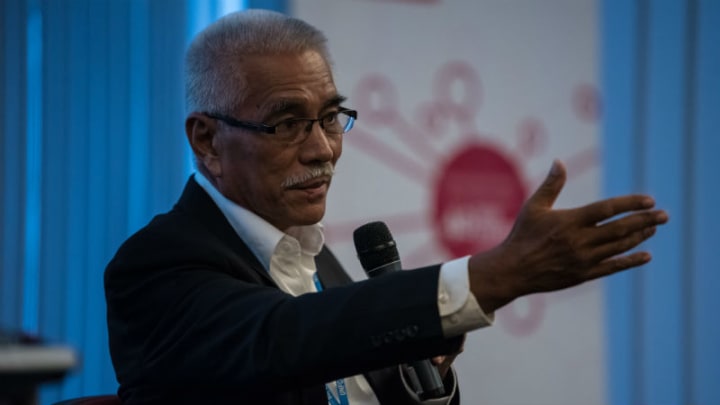
MADRID — Kiribati, made up of 33 low-lying atolls in the Pacific Ocean, has a history of resilience building and climate justice advocacy. It is also one of the world’s most vulnerable countries to climate change, at risk of becoming uninhabitable, and even disappearing, as sea levels rise.
Anote Tong, former president of the island nation between 2003 and 2016, realized the threat of climate change early on and began to prepare for what was to come, putting his country at the forefront of international climate solutions.
“Based on the predictions of the science, our islands will go underwater,” Tong told Devex in an interview during the United Nations Climate Change Conference COP 25 in Madrid. “So unless we can do some very radical adaptation strategies, I’m afraid we have to move ... You don’t wait around, you must begin to plan.”
“It’s one of the most painful things that I’ve ever had to go through: understanding and coming to terms with the knowledge that you have no option but that [to migrate].”
— Anote Tong, former president 2003-2016, KiribatiAnd this is what he did, dedicating much of his three terms in office to making preparations for the future realities of climate change and developing what he has referred to previously as “radical solutions” to protect the people of Kiribati. This included building floating islands and purchasing land from other sovereign nations: in 2014, the government bought 5,500 acres on Fiji to try and ensure food security in case of dramatic climate change impacts.
Taking a longer-term view, Tong also implemented a program called “Migration with Dignity,” which aims to create a skilled workforce able to find decent employment abroad.
Devex Senior Reporter Michael Igoe is at COP25 in Madrid. Sign up to our special edition newsletter to receive a wrap-up briefing next Monday.
But since he left office in 2016, the new administration has taken a different approach. In conversation with Devex, Tong discussed a number of reversals on previous policies, the adaptation plans he developed, his experience during previous climate change negotiations, and his hopes for COP25.
This conversation has been edited for length and clarity.
You became president of Kiribati in 2003; at what point did you first become aware of the severity of the climate change crisis for your country and what has your personal journey been like in coming to terms with this?
The story of climate change is not a new one ... it was something I was aware of as I was going into office. From 2003, I started reading the reports coming out of the IPCC [Intergovernmental Panel on Climate Change] and the predictions were not good for us. I was worried because even if the possibility was 5%-10% of what was being predicted [was] true, we need to be worried. But by the fourth assessment report, it really was much more conclusive.
It was very difficult. I could not understand why, if this was true and the science was correct, countries who are causing this can continue to do so.
It was a frustrating period of time and the lack of response to my pleadings at the United Nations General Assembly … it was an existential threat, yet nobody seemed to care, no-one was listening.
That went on until after Copenhagen [COP15 in 2009] — which was quite a dismal failure — but after that, there seemed to be a change of thinking, maybe because there was a change of guard at the United Nations and the new U.N. secretary-general came in, and also the change in the presidency within the United States.
Perhaps those two culminated together to bring about what is happening today. [But] that was a bit of a painful process; Paris [COP21, 2015] when it happened was a highlight of the moment, but it really hasn’t brought any real concrete effective outcomes.
And now at COP25, four years after the Paris Agreement, what do you think will be the outcome?
I really can’t tell what’s going to happen. But I can tell you what I hope will happen. I hope that there will be a greater realization and acknowledgment on what really is coming. I know that there is this obsession with focusing on our priorities within our nations, but we need to see what’s coming — it’s coming at full speed.
“There is no planning, people will just have to be moved — I emphasize the word ‘moved’ — to somewhere where they will be safe.”
—Have you seen any reversal of the progress made during your leadership by the current administration, and how do you see your role now given this difference in the current leadership’s priorities?
One thing that has changed is the migration [with dignity policy] … I don’t know if they can come up with something better — all well and good. [But] you have to be proactive. Take charge, take some measure of control. If government commits the resources to prepare people … they can migrate with dignity.
One of the issues [during my term] that I wanted to do was build climate resilience, and to try and mobilize the resources. When I was saying these things we were the nations facing an existential threat.
Today, every other nation is facing the existential threat. To scramble for resources to build resilience — there’s going to be a long queue. That’s why I wanted it to happen early, so that we can do it and demonstrate that it is doable, and what it takes to make it happen.
Could you talk a bit more about how and why you developed the initiative "Migration with Dignity"?
It’s one of the most painful things that I’ve ever had to go through: understanding and coming to terms with the knowledge that you have no option but that [ to migrate].
I can understand the denial of this. That’s the most comfortable reaction, to deny it. But let’s be practical: if the seas are rising above the land, how can you continue to stay? Based on that you have to acknowledge the brutal reality and come to terms with it. And it’s not easy. You almost have to be dispassionate about it, in planning it. So if that happens and there is no planning, people will just have to be moved — I emphasize the word “moved” — to somewhere where they will be safe.
“Migration with Dignity” is a proactive response to something that you know is going to happen. Don’t wait for it to happen and then begin to plan for it. Migrate as people with skills, worthwhile citizens, not as second class citizens.
And what message do you have for the global community on what action needs to be taken to ensure a future for countries like Kiribati?
It’s about inclusion, it’s about not thinking about yourself but understanding that what you do here in Madrid has implications for people on the other side of the world … we may not feel the impacts straight away, but somebody else on the other side of the world will. The reality is that no-one is immune from this. We’re all in this together, and we must try to address it collectively. We have to all play our part. If those of us who have the capacity to do something about the problem, they do also have the obligation to do it.
Naomi Mihara contributed reporting as part of the Climate Champions series at Devex.
Visit the Turning the Tide series for more coverage on climate change, resilience building, and innovative solutions in small island developing states. You can join the conversation using the hashtag #TurningtheTide.





